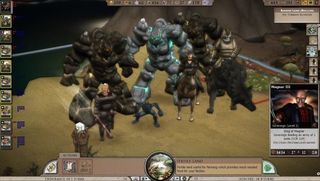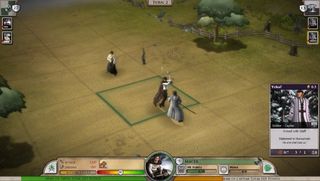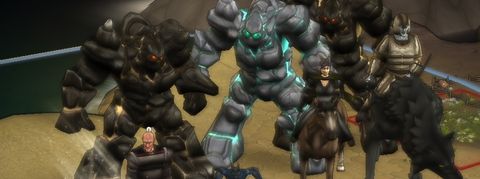Our Verdict
The bare bones of a hugely exciting strategy RPG hybrid. The the AI just isnt good enough to make it special, yet.
PC Gamer's got your back
I need 1,300 gold immediately. The latest bit of military research I've unlocked lets me make teams of things, and one of the things I can make teams of is my killer hell dogs from hell. This gives the resulting unit six times their enormous health, six times their enormous damage, and for reasons that aren't really clear to me, six times their enormous armour rating. So even though it's just six hell dogs from hell standing next to each other, they take 36 times as long to kill. 1,300 is a lot of gold – or Gildar as it's pointlessly renamed in Elemental – but for 36 hell dogs from hell, it's a steal.
Elemental is mainly a turn-based strategy game, but there's a turn based RPG in there too. Your sovereign is a hero who can level up as he slays the fantasy landscape's indigenous creatures and enemy factions. You get resources by founding new towns near mineral deposits, by killing creatures, or by trading with other races. So now I'm trying to figure out what I can sell to a wealthy minor faction in the south.

Materials? I made good cash early on selling them way more than they needed, so they're wise to me now.
Metal? Ditto.
Crystal? I don't have much, and to be honest I want it for myself – I need it to make magic items for my troops.
My wife. I can sell my wife? Why can I sell my wife? How can I sell my wife? What happens to my wife if I sell her? Am I really going to sell my wife? More to the point, how much will they pay for my wife?
All of it. All of the money. Everything they have and, if they had it, more – over 8,000 goldzor or whatever. I have no idea why. She's not worth that much to me, and I'm married to her.
Well, that settles it. A pleasure – an uneasy and slightly guilty pleasure – doing business with you guys. Enjoy the six to thirty-six hell dogs from hell that I can now afford to destroy you with.
The hell dogs are unstoppable, and I win the game a long but unchallenging while later. The whole experience is typical of Elemental: exciting possibilities, confusingly stupid decisions from the AI, masses of freedom to come up with killer combinations, and absolutely no resistance when you do so. The game has been released far, far too early, and what we've ended up with is a tantalising prototype for a phenomenal game that just doesn't exist yet.
Elementary
The sad part is, I'm happy it's even reached this stage. When Elemental launched, earlier than expected, it barely worked. On every machine I tried it on, it would crash to desktop so frequently as to be practically unplayable, and the AI was so bad you couldn't even call it stupid – it barely moved.
That's the game Stardock put in the box, relying on a day-one patch to get it to an acceptable state. But the game's requirements don't include an internet connection to play, and even if they did, the optimistically named 'day 0' patch wasn't out when they actually released the game to pre-orderers.
It was five patches before the game was stable on either my home or work PCs, and a week after release, the advertised multiplayer still isn't there. I don't mean it's not good yet, I mean it's not there. They just left a whole feature out, one that's still listed on the box, with the intention of 'switching it on' later. So this review is of the 1.06 version of the game, which is stable but still very rough. See www.elementalgame.com for the latest.

Elemental has a campaign, but it's really more of a tutorial. The meat of it is in large-scale one-off matches against up to nine AI opponents, on fantasy continents that are randomly chosen and randomly populated, but not themselves randomly generated. You explore them looking for good resource tiles, then build towns on them for profit.
There are also curiosities like treasure chests that your sovereign can investigate for small resource rewards, and other low-level heroes you can recruit. And long before you run into any other civilisations, you'll deal with a lot of local wildlife and brigands – hostile on contact, but not especially aggressive if you ignore them. So you develop your town and found new ones while your heroes fight monsters and level up. And eventually, you clash with someone else doing the same thing.
At times it's a tremendously exciting game: when I realised I could buy a horse and a bow for my sovereign, I blew a nerdgasket. Marriage is pretty rudimentary – click on someone of the opposite sex and click 'marry' – but when your kids come of age and become units in your army, there's a wonderful sense of attachment and pride.
Periodically able
But most of this excitement is over the game Elemental could be, rather than the game it is. You keep finding cool new things to try, and the AI keeps finding sad new ways to lose. I'm one of the most reckless, incompetent and deluded generals imaginary history has ever known, and even for me, six AI opponents on the Ridiculous difficulty setting are boringly easy. That's the smartest AI the game has, plus cheaty bonus resources, but it doesn't feel like it. Wealth can't cure stupidity.
I'd settle for some moxy. In dozens and dozens of hours of play, the AI has declared war on me perhaps twice, and invaded a town perhaps once. In every other case, I've steamrolled them out of boredom as much as any strategic necessity.
Occasionally one race will expand dramatically, but they're still trivial to topple because they don't understand one of the game's core mechanics. If your sovereign dies in enemy territory, your whole empire is wiped out. So when you take the town they're in, do enemy sovereigns run from this newly hostile territory? I'll give you a clue, it rhymes with 'No, they don't, in fact they sometimes run directly into this territory if they're not already in it, because they are blorons.'

They also have no personality. The races are all human or human-with-grey-skin, as if Stardock were wrestling with a tight make-up budget, and their attitudes are just as interchangeable. It's a strange flaw to have, because the greatest example of characterful AI I've ever seen was the last game Stardock developed: Galactic Civilizations II.
That game also knew how to generate a strategically interesting landscape, even better than the Civ series. The good planets were so rare and exciting that I fought for them rabidly, and I could specialise each one I conquered so that it meant something to me. In Elemental, one patch of gold and fertile land is much like another, and so are the towns you build on them.
Flatland
In theory you can specialise, but in practice almost everything you can build is (a) cheap and (b) a one-per-town deal. So you may as well add one to each settlement, making an efficient but utterly boring empire. There's rarely any strong strategic motive to invade a specific part of your enemy's empire, nor any emotional punch to losing a specific part of yours. It's a very flat game.
One of the things I like most about all Stardock games is the sense of discovery. They're all absurdly ambitious, dauntingly complex, and wonderfully unrestrictive. It takes a bit of manual-scouring, forum-trawling, and avid attention every time a loading screen tip pops up, but that's all part of the nerdy pleasure of an over-intricate game.
That's still true of Elemental: for most of my playing time I enjoyed exploring the possibilities. Even the possibility of selling my wife to buy better hell dogs. The difference is that once you've done that, you're playing Elemental on a level its AI can't compete with, and every match starts to unfold the same way. It was enough fun to be worth the money, for me, but it's little more than a template for the game it could have been. The game it might still become, with enough patching.

I'm baffled and saddened that they'd release it like this. The unforgivable state of the game at launch, the inert AI, and the entirely missing multiplayer all stem from that single enormous mistake. It's one of the most catastrophic decisions I've ever seen a great developer make.
And Stardock are usually the good guys: they wrote a Gamer's Bill of Rights that says we deserve finished games out of the box. Their skills at producing fun AI are unmatched in the industry. They have perhaps the only team capable of doing this ridiculous game idea justice.
Instead, they've taken more than three years of work and kicked it out in a state that's turned anticipation into outrage, community excitement to shared disappointment, and the goodwill of fanboys like me into total dismay.
As a game? It's pretty good. As a decision? An utter disaster.
The bare bones of a hugely exciting strategy RPG hybrid. The the AI just isnt good enough to make it special, yet.

